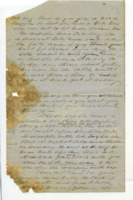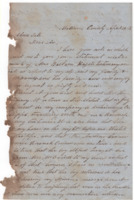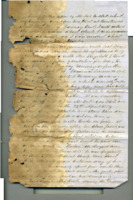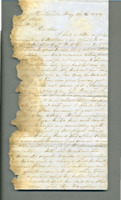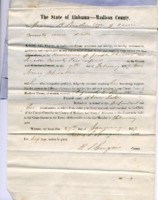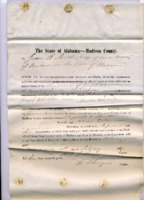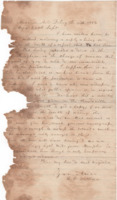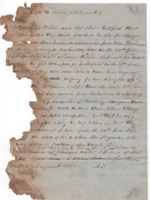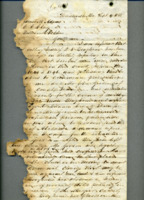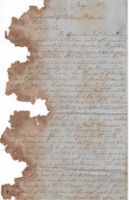
Browse Items (18 total)
Sort by:
-
Partial deposition and court questions.
This page is most likely missing a few pages. The front details someone's statement, though the author is unknown. It tells of phrases spoken by Abner Tate that were overheard by Mrs. Hazel. The botton of the page inquires what the author/interviewee would think if they heard such phrases. The last line appears to have the initials S. D. G. that may be the author of the page. The back side includes questions 13 through 18 that were most likely asked in court. -
Letter to Abner Tate.
The letter to Abner Tate addresses the testimony of Barbara Hazel, confirming some parts but refuting more of it. It is clear that pages of the letter are missing as it ends in the middle of a sentence and has no author's signature on any page. Note: This could be Moore's statement which would match with the Note to Moore's Statement. -
Testimony of a Resident of Elizabeth Routt as Requested by Abner Tate.
The author of this written statement is illegible. It appears that the first name of the author may be Francis but it being so faded, is difficult to discern. The author does state that he was living with Elizabeth Route at the time and managing her plantation, during which he became aquainted with Daniel H. Bingham. The written statement, recorded as the author was "called upon by Mr. Tate to state what my testimony was upon his trial...", details the interaction of the author with Bingham, who wished to marry Mrs. Routt, and Mrs. Routt, beginning in March 1854 through 1855. -
Letter Regarding the Case and Barbora Hazle's Statements.
This letter, written on May 12, 1856, has several names that are illegible, including the author's. It is addressed to two men, the first being [Daniel] P. Pool, and is a lengthy letter in response to a letter received from Abner C. Wellborn and in particular, the supporting testimony of Barbara Hazel accusing Abner Tate of at least two murders. The author states that the credibility of Hazel's words should be questioned due to the several reasons he goes on to detail. Following the original letter, the author pens an amendment to include changes that occured since the original letter was written as Tate had made a recent publication during that time. -
Deposition of Nancy Whitaker.
Nancy Whitaker acted as a witness for the defendant, Abner Tate. Nancy responds to questions about Alexander Jeffries, her father, and Elizabeth Routt. She expresses her belief that her father was poisoned by Routt though she was not present until the morning after he died. Nancy details the dark color of her father's body and how it was swollen and "unnatural" in appearance. She also includes the rumors she has heard regarding several charges brought against Routt. She concludes by stating that it is her opinion that Routt is guilty in the case of her father's death. -
Depositions of Joseph Whitaker and Newton Whitaker.
The Whitakers were witnesses for the defendant, Abner Tate. Joseph Whitaker's deposition is first. He answers questions regarding Elizabeth Routt and her husbands, particularly the death of Alexander Jeffries. Joseph states that it is his opinion that Jeffries was poisoned. He also states that rumors have spread that she had ordered a slave to murder Abner Tate. Newton Whitaker's desposition is second. He also answers questions regarding Elizabeth Routt and her husbands, including the death of Alexander Jeffries. Newton states that he is also of the opinion that Jeffries was poisoned. Like Joseph, he also adds that she is said to have destroyed the lives of her husbands, stole cotton, and sought to harm Abner Tate. -
Letter from H. G. Wellborn to her uncle.
Wellborn writes to her uncle requesting information on the case of her "Pa", Abner Tate, who was arrested and tried for murder. She informs her uncle that there was a supposed detailed report in a Huntsville publication but couldn't get her hands on a copy. She concludes by writing of their temporary living arrangements just outside of Memphis, Tennessee. -
Note to Moore's Statement.
The Note to Moore's Statement was signed A.T., alluding to the possibility that Abner Tate wrote this. The note discusses the testimony of Mrs. Willis and Colonal Sheid regarding a search for Sawyer, one of the murdered men. It traces Sawyer's known whereabouts prior to him going missing. The note claims that A.T. had never heard of Sawyer or Rein, the second victim, until August 1855. -
Letter to James M. Adams, C. C. Clay, and William Acklen from Abner Tate.
This letter, written on September 4, 1855, contains information regarding several murders the occurred at the [sic] House between 1841 and 1846, as reported by D. H. Bingham. He further details the arrest and imprisonment of a Mr. John Gordon in relation to the murders, and his appearing in court. Possible information regarding the burial of the murdered men are offered in the letter as well. The letter ends with Abner Tate discussing the validity of certain confessions as many "delight" in "destroying the reputations of others." -
Statement of William W. Sanders addressed to Abner Tate.
In his statement, William W. Sanders details the day Mrs. Hazel claimed to have seen Sawyer's body being burned by Abner Tate's slaves. He tells of how she told the story to him and that he was surprised when she relayed everything to him. Sanders ends by stating he believes Mrs. Hazel charged a "man of excellent character".
